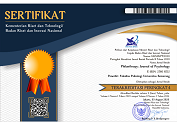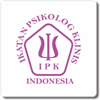Healthy Living Behavior, Life Satisfaction and Social Support In Productive Age Individuals
Abstract
Abstract. Indonesia will face an era of demographic bonus and the health of the productive age is valuable capital for accelerating development. The aim of the research is to determine the effect of healthy behavior on life satisfaction with social support as an intervening variable. Research population of individuals of productive age in Indonesia. The research sample was individuals aged 21 to 45 years who lived in Semarang, Solo, Jakarta, Surabaya and were not on a medical diet. The sampling technique is accidental sampling using Google Form. The data analysis technique uses intervening variable regression with the path analysis method with the SPSS application. The results of data analysis from 245 respondents showed that there was a significant direct influence of healthy living behavior on life satisfaction of 0.182 and there was a significant indirect influence of healthy living behavior on life satisfaction through social support of 0.285. Healthy living behavior must be carried out continuously to support productivity so that it contributes to life satisfaction in the future.
Keywords: Healthy Living Behavior; Social Support; Life SatisfactionFull Text:
PDFReferences
Ahdiat, A. (2023). Indonesia punya penderita diabetes tipe 1 terbanyak di ASEAN. Retrieved from https://databoks.katadata.co.id/datapublish/2023/02/10/indonesia-punya-penderita-diabetes-tipe-1-terbanyak-di-asean
An, H., Chen, W., Wang, C., Yang, H., & Huang, W. (2020). The relationships between physical activity and life satisfaction and happiness among young, middle-aged, and older adults. International Journal of Environmental Research and Public Health, 17(13), 4817. https://doi.org/10.3390/ijerph17134817
Arlinta, D. (2019). Hanya 20 persen penduduk Indonesia yang mengerti gaya hidup sehat. Retrieved from https://www.kompas.id/baca/utama/2019/09/20/kesehatan-germas-jangan-hanya-jargon
Azis Y.P., Ikhlasiah, M., & Ismarina. (2024). The relationship between the effectiveness of "ingenious" behavior in efforts to control hypertension at productive age in the working area of the jombang health center in cilegon city in 2023. International Journal of Accounting, Management, Economics and Social Sciences (IJAMESC), 2(2), 499–505. https://doi.org/10.61990/ijamesc.v2i2.212
Bakkeli, N. Z. (2021). Health, work, and contributing factors on life satisfaction: A study in Norway before and during the COVID-19 pandemic. SSM - Population Health, 14, 100804. https://doi.org/10.1016/j.ssmph.2021.100804
Bramhankar, M., Kundu, S., Pandey, M., Mishra, N. L., & Adarsh, A. (2023). An assessment of self-rated life satisfaction and its correlates with physical, mental, and social health status among older adults in India. Scientific Reports, 1–13. https://doi.org/10.1038/s41598-023-36041-3
Cohen, I. S., & Syme, S. L. (1985). Issues in the study and application of social support. Academic Press.
Cohen, S. (2004). Social relationships and health. American Psychologist, 59(8), 676–684. https://doi.org/10.1037/0003-066X.59.8.676
CoreHealth. (2023). Leveraging the power of nutrition to boost employee wellness. Retrieved from https://blog.corehealth.global/leveraging-the-power-of-nutrition-to-boost-employee-wellness
Diener, E., Emmons, R. A., Larsen, R. J., & Griffin, S. (1985). The satisfaction with life scale. Journal of Personality Assessment, 49(1), 71-75. https://doi.org/10.1207/s15327752jpa4901_13
Indraswari, D. L. (2023, September). Mutu kesehatan tentukan kualitas bonus demografi Indonesia. Retrieved from https://www.kompas.id/baca/riset/2023/09/29/mutu-kesehatan-tentukan-kualitas-bonus-demografi-indonesia
Isranda, N., Hasan, H., Febriawati, H., & Angraini, W. (2021). Pengaruh kecemasan dan dukungan sosial terhadap perilaku kesehatan pegawai kesehatan Kabupaten Rejang Lebong. Jurnal Miracle, 1. Retrieved from https://jurnal.umb.ac.id/index.php/miracle/article/view/1333/pdf_1
Its Time Texas. (2020). How does social support affect your health? Retrieved from https://itstimetexas.org/how-does-social-support-affect-your-health/
Kazemi, A. F., Aslani, A., & Hajian, S. (2021). Association between perceived social support and health-promoting lifestyle in pregnant women: A cross-sectional study. Journal of Caring Sciences, 10(2), 117-124. https://doi.org/10.34172/jcs.2021.018
Kominfo. (2020). Komitmen pemerintah wujudkan bonus demografi yang berkualitas. Retrieved from https://www.kominfo.go.id/content/detail/27423/komitmen-pemerintah-wujudkan-bonus-demografi-yang-berkualitas/0/berita
Koran Sindo. (2022). Kebugaran orang Indonesia rendah. Retrieved from https://nasional.sindonews.com/read/672353/15/kebugaran-orang-indonesia-rendah-1643598094
Mariyati, L. I., & Rezania, V. (2021). Buku Ajar: Psikologi Perkembangan 1. UMSIDA Press. Retrieved from https://press.umsida.ac.id/index.php/umsidapress/article/view/1291
Menaldi, A., & Meinarno, E. A. (2023). Perilaku sehat = psikologi kesehatan + kebudayaan. Buletin KPIN, 9(09). Retrieved from https://buletin.k-pin.org/index.php/daftar-artikel/201-vol-9-no-09-mei-2023/1278-perilaku-sehat-psikologi-kesehatan-kebudayaan
Miswarman, E., Maylianti, Y., & Page, M. T. (2022). Hubungan dukungan keluarga dengan perilaku hidup bersih dan sehat pada anggota keluarga di wilayah kerja puskesmas Lembang pada masa pandemi Covid-19. Nursing Science Journal (NSJ), 3(2), 91–99. https://doi.org/10.53510/nsj.v3i2.124
Mo, P. K. H., Wong, E. L. Y., Yeung, N. C. Y., Wong, S. Y. S., Chung, R. Y., Tong, A. C. Y., ... & Yeoh, E. (2022). Differential associations among social support, health promoting behaviors, health-related quality of life and subjective well-being in older and younger persons: A structural equation modelling approach. Health and Quality of Life Outcomes, 20(1), 1-12. https://doi.org/10.1186/s12955-022-01931-z
Nusra, S. A., Sudana, I. M., & Raharjo, B. B. (2022). Provision of media booklets on increase knowledge of junior school children. Kemas: Jurnal Kesehatan Masyarakat, 18(2), 202–208. https://doi.org/10.15294/kemas.v18i2.37494
Pakpahan, M., Siregar, D., Susilawaty, A., Tasnim, M., Mustar, R., Manurung, E. I., ... & M, M. (2021). Promosi kesehatan & perilaku kesehatan. Jakarta: EGC (1st ed.). Yayasan Kita Menulis.
Pertiwi, R., Maulina, D., & Mulyati, D. (2021). Perilaku self-care pada usia dewasa dengan masalah hipertensi. JIM Fkep, 1. Retrieved from https://jim.usk.ac.id/FKep/article/view/18119
Purwanto, B. (2022). Masalah dan tantangan kesehatan Indonesia saat ini. Retrieved from https://kesmas.kemkes.go.id/konten/133/0/masalah-dan-tantangan-kesehatan-indonesia-saat-ini
Rahmadian, S. (2011). Faktor-faktor psikologis yang mempengaruhi perilaku sehat mahasiswa beberapa perguruan tinggi di Tangerang Selatan. (Skripsi). Retrieved from https://repository.uinjkt.ac.id/dspace/handle/123456789/1748
Rahmawati, Y., & Nofiana, F. (2021). Sulit termotivasi untuk olahraga? Mengajak teman bisa jadi cara ampuh. Retrieved from https://www.suara.com/health/2021/07/12/150030/sulit-termotivasi-untuk-olahraga-mengajak-teman-bisa-jadi-cara-ampuh
Riadi, M. (2021). Kepuasan hidup: Pengertian, aspek, karakteristik dan faktor yang mempengaruhi. Retrieved from https://www.kajianpustaka.com/2021/02/kepuasan-hidup-pengertian-aspek.html#google_vignette
Sherbourne, C. D., & Stewart, A. L. (1991). The MOS social support survey. Social science & medicine (1982), 32(6), 705–714. https://doi.org/10.1016/0277-9536(91)90150-b
Stenlund, S., Koivumaa-Honkanen, H., Sillanmäki, L., Lagström, H., Rautava, P., & Suominen, S. (2021). Subjective well-being predicts health behavior in a population-based 9-years follow-up of working-aged Finns. Preventive medicine reports, 24, 101635. https://doi.org/10.1016/j.pmedr.2021.101635
Vereswati, H. (2014). Hubungan spiritualitas, resiliency of self-efficacy dan dukungan sosial dengan kesejahteraan psikologis subjektif pada penderita hepatitis B. (Thesis). Universitas Muhammadiyah Surakarta. https://eprints.ums.ac.id/39304/
Yuniati, F., & Kamso, S. (2021). Assessing the quality of life among productive age in the general population: A cross-sectional study of family life survey in Indonesia. Asia-Pacific Journal of Public Health, 33(1), 53–59. https://doi.org/10.1177/1010539520956411
Yusuf, U., Erawan, B., & Hermanu, E. (2017). Hubungan kondisi fisik, tingkat kesehatan, psikologis dengan prestasi atlet cabang olah raga beladiri Jawa Barat di PON XIX 2016. Jurnal Kepelatihan Olaharaga, 10, 1-10. https://ejournal.upi.edu/index.php/JKO/article/downloadSuppFile/16143/2264
DOI: http://dx.doi.org/10.26623/philanthropy.v8i1.8585
Refbacks
- There are currently no refbacks.
Copyright (c) 2024 Hermiana Vereswati, Sri Widyawati, Martha Kurnia Asih

This work is licensed under a Creative Commons Attribution 4.0 International License.












